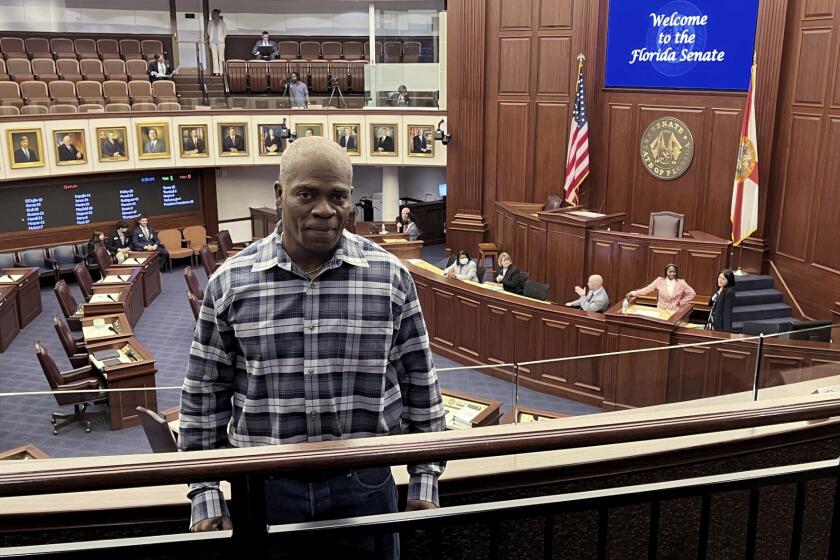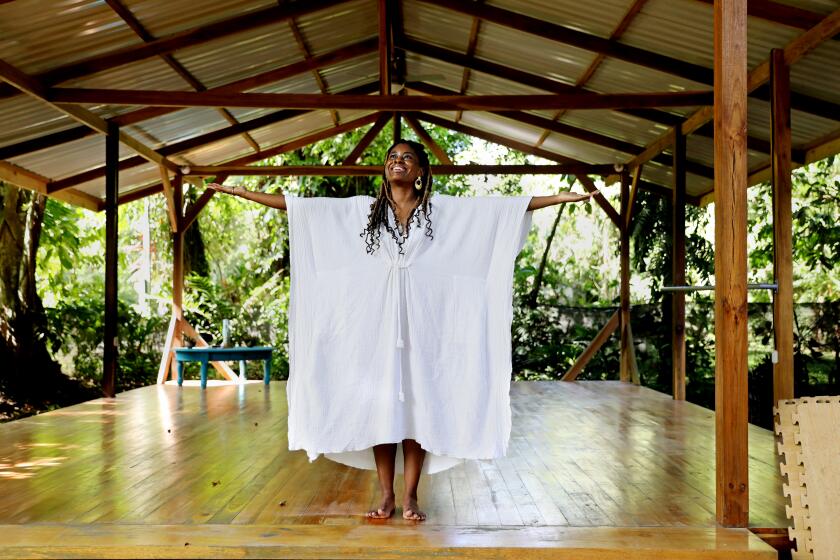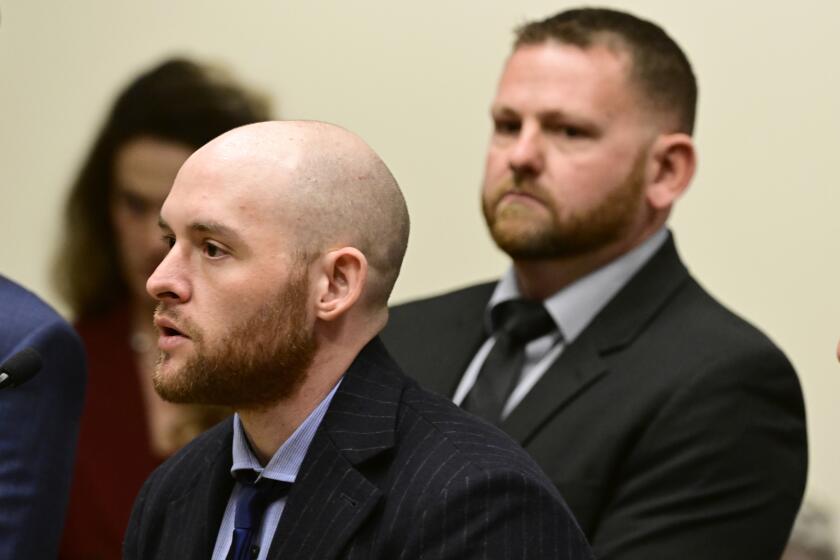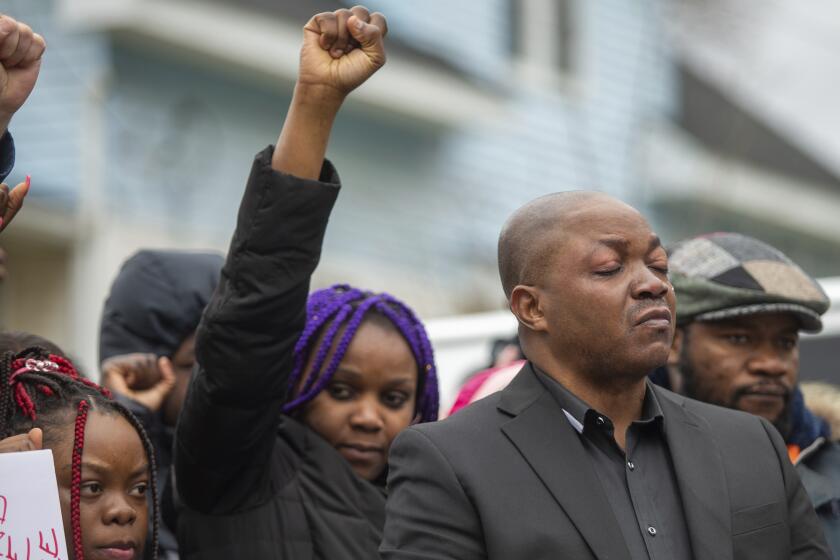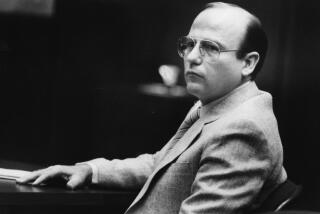Video shows Georgia deputy fatally shooting exonerated Black man during traffic stop
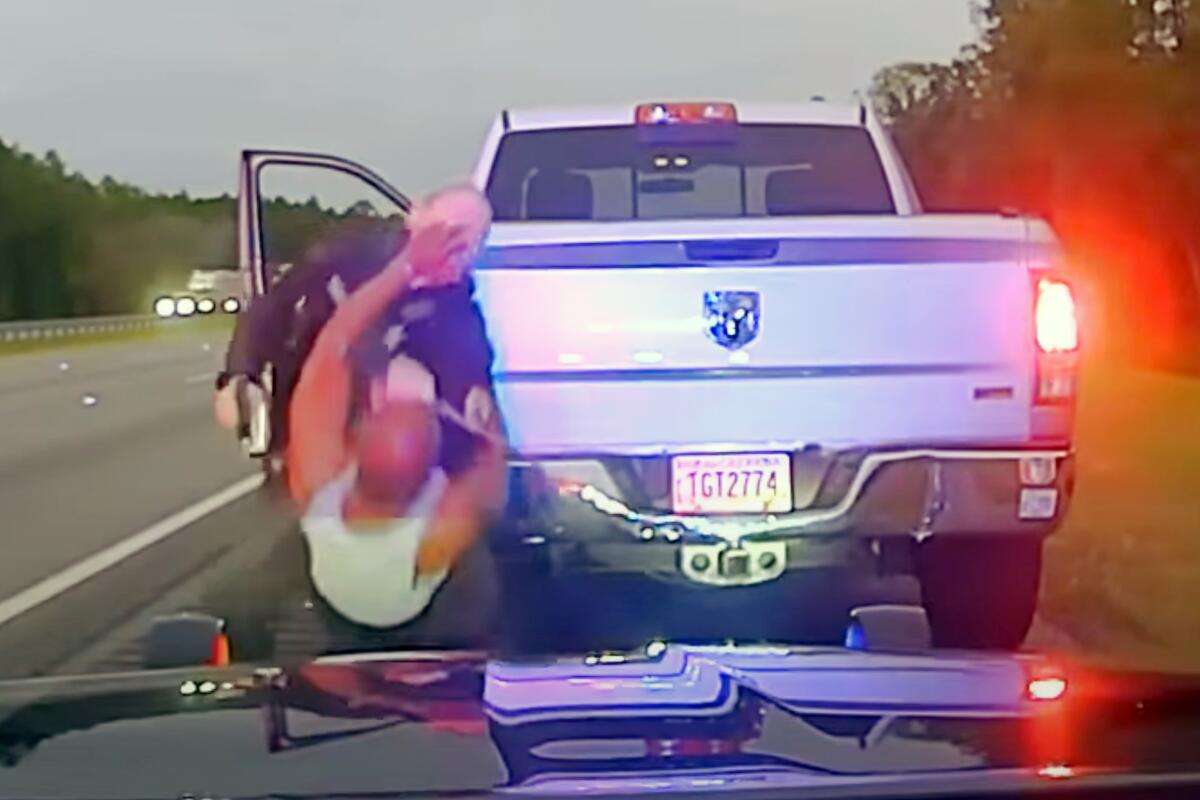
- Share via
Georgia officials on Wednesday released body and dash-cam video showing how a traffic stop turned deadly between a sheriff’s deputy and Leonard Allan Cure, who was exonerated and released from prison about three years ago after spending 16 years behind bars for a crime he did not commit.
Cure, 53, who was Black, was shot and killed Monday by the Camden County, Ga., sheriff’s deputy after he was pulled over on Interstate 95 on suspicion of speeding. Cure had been returning home to suburban Atlanta from visiting his mother in southern Florida.
In the dash-cam video, the deputy, whom the sheriff’s office confirmed to The Times is Staff Sgt. Buck Aldridge, pulls over a pickup truck that can be seen driving down the interstate. According to the sheriff’s office, Cure was going at least 100 mph in an area where the speed limit was 70.
Aldridge repeatedly yells at Cure to step out of the vehicle, and orders him to put his hands on the back of the truck. Cure steps out and tells the deputy he was not doing anything. When Aldridge tries to grab his right arm, Cure yanks it away.
Aldridge takes out and points his Taser at Cure, again ordering him to the rear of the vehicle as Cure questions the deputy. Aldridge warns Cure that he will get tased if he doesn’t go to the back of the truck, and Cure follows the deputy’s orders. He puts one hand on the back of his truck, and then the other. After a few moments, Aldridge instructs Cure to put his hands behind his back. “Do I have a warrant?” Cure asks.
Leonard Allan Cure spent 16 years behind bars for a robbery he didn’t commit. Less than three years after his release, he was shot and killed during a traffic stop in Georgia.
Aldridge once again threatens to tase Cure if he doesn’t put his hands behind his back. Cure asks the deputy why he would get tased.
“You are under arrest for speeding and reckless driving,” said Aldridge, adding that Cure passed him going “100 miles an hour.”
“So that’s a speeding ticket, right?” Cure asks.
Aldridge tells Cure that tickets are criminal offenses in Georgia, and the two men argue as Cure ignores the deputy’s request to put his hands behind his back.
“I’m not going to jail,” Cure says.
“Yes, you are going to jail,” Aldridge responds. Cure looks up and points one arm toward the sky, and the officer deploys his Taser.
‘I’m not captive any more,’ says a Californian now living in Costa Rica — one of many Black Americans citing racism as why they’re leaving the U.S.
Cure stops moving momentarily, and the interaction then turns violent. Cure turns toward Aldridge and flails his arms. The deputy again tases Cure, and the two men have their arms wrapped around each other on the side of the interstate. Cure grabs Aldridge’s face and pushes his face and body against the truck and is heard saying, “Yeah, b—” twice as the two struggle. Aldridge repeatedly whacks Cure in the thigh with a baton. He then takes out his gun and shoots Cure in his left side and Cure falls to the ground. Aldridge orders him to stay down.
Aldridge calls in that shots are fired, and additional officers arrive on the scene. Officials provide aid to Cure, including chest compressions, before paramedics arrive. Cure later died, according to authorities.
Aldridge has been placed on administrative leave, said Capt. Larry Bruce, a public information officer with the Sheriff’s Office.
The Georgia Bureau of Investigation is handling the case. Stacy Carson, the GBI special agent in charge, said there were no new details Thursday and the investigation is ongoing.
At a news conference Wednesday outside of the Camden County Courthouse in Georgia, civil rights attorney Ben Crump, who is representing Cure’s family, said it was “clear that the officer got out of the car in a very aggressive way” and that the officer never attempted to de-escalate the situation.
Cure’s brothers, who were also at the news conference, described the video as “disheartening,” and also said there was no attempt to reduce the intensity of the interaction.
Jurors have convicted a Denver-area police officer and acquitted another of charges in the 2019 death of Elijah McClain.
Wallace Cure said there was “absolutely no reason why my brother was murdered for a traffic stop.” He acknowledged that his brother and Aldridge engaged in an altercation, but also said that he’s seen interactions with law enforcement that did not turn fatal.
Michael Cure said his brother “did turn and get a bit physical, but for the most part, he was completely compliant.” He added that his brother may have been dealing with some mental health issues.
“The officer just triggered him,” he said. “It was excitement met with excitement.”
Crump underlined Leonard Allan Cure’s history as an exoneree who was wrongfully convicted, saying that Cure’s “PTSD,” or post-traumatic stress disorder, was likely sparked when Aldridge told him he was going to be arrested and jailed.
Cure had been sentenced to life in prison after he was wrongfully convicted in the armed robbery of a Walgreens in Broward County, Fla., in 2003, according to the Innocence Project. Though the first jury deadlocked on the charges, another convicted Cure, who received the life sentence because he had previous offenses, the South Florida Sun Sentinel reported.
Cure spent 16 years in prison before he was exonerated in December 2020 after the Innocence Project reinvestigated his case in partnership with the Broward County Conviction Review Unit, which had been established a year earlier to review claims of wrongful conviction.
Video shows a police officer struggling with a Black man over a Taser before fatally shooting him in the head while the man was facedown on the ground.
The Conviction Review Unit found that an ATM receipt proved Cure was miles away from the scene at the time of the robbery, and that an array of photos shown to a victim contained multiple photos of Cure, making it an “unreliable, suggestive identification procedure,” the Innocence Project said in its statement.
“Based on these findings, the state of Florida realized that [Cure] was actually innocent and moved for his release and exoneration,” the organization said.
Broward County State Atty. Harold F. Pryor and his team described Cure as a “smart, funny and kind person” who remained active in criminal justice work and kept in touch with the team after his exoneration.
“He visited prosecutors at our office and participated in training to help our staff do their jobs in the fairest and most thorough way possible,” the state attorney’s office said in a statement.
The state of Florida apologized to Cure after his release, and in July, Gov. Ron DeSantis approved a claims bill compensating him $817,000 plus educational benefits for his time in prison, the Sun Sentinel reported.
Cure received the money in August, and used it to help purchase a home in Fairburn, Ga., according to the Georgia Innocence Project, which had Cure speak to high school students just over two weeks ago for Wrongful Conviction Day.
“After all that he endured, Leonard deserved to live his life in freedom,” the Georgia Innocence Project said.
More to Read
Sign up for Essential California
The most important California stories and recommendations in your inbox every morning.
You may occasionally receive promotional content from the Los Angeles Times.
